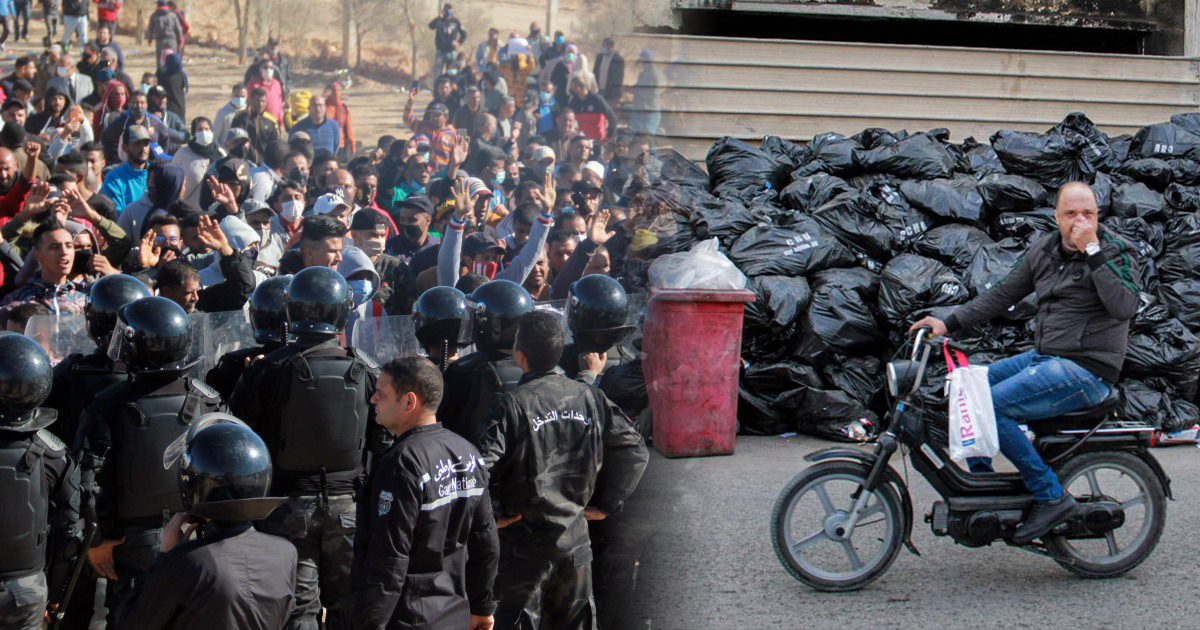Instability still prevails in Tunisia, despite the formation of a new government under the leadership of Naglaa Boudin. This was illustrated by protests in the town of Aqareb, 20 km southwest of the province of “Safaqis”, which continued for several days, and turned deadly on the 9th of November with the death of one protestor after clashes with the police. In its turn, the Tunisian General Labor Union for a strike in both the public and private sectors in the town of Aqareb from the 10th of November. This growing discontent is linked to many problems, including the continuing use of emergency measures, to which some of the forces associated with the “Jasmine Revolution” still object. They as well called for protests, putting forth a number of demands: restoring parliament, the formation of a national unity government, canceling the suspension of the constitution, (specifically since all these actions have isolated Tunisia internationally and this is the main demand to have Tunisia be welcomed back in the international community).The immediate cause of the protests in “Safaqis” however, was the amount of rubbish left on the streets throughout Tunisia.
Protests in the town of Aqareb in Safaqis province broke out following a decision by the town’s inhabitants to keep the garbage dump in the town closed, despite a decision by the Ministry of Environment to re-open it because of garbage pile-up in the streets over a period of 40 days. Garbage has piled up near hospitals, schools, and shops in a manner that threatens the environment. The town’s inhabitants are basing their opposition to the reopening of the dump on a court decision to close the dump that was issued in July 2019. The dump was in fact closed down, following complaints that thousands of tons of garbage in the dump had become a threat to the environment. The towns citizens demanded another location be found to dump garbage, as this one had reached its maximum capacity. However, the government recently saw the need to re-open the dump, to dispose of the garbage piled up on the streets of Aqareb, Sparking anger there. The current government headed by “Boden” is currently trying to find a way to deal with garbage that is piling up all over the country.
Matters escalated with more protestors pouring onto the streets in Safaqis following the death of one protestor from inhaling tear gas, which was used in excess against protestors. While authorities denied that any action on their part was the cause of the protestor’s death, angry protestors burned down one of the main National Guard centers in the province. Citizens objected to the approach taken by the government in dealing with their local problems, which led to heightened tensions and more clashes.
The issue took on a national dimension when Tunisia’s president, Kais Saied, declared that events in Safaqis were in fact the result of a conspiracy by his opponents, who seek to pressure him into removing the emergency measures he put in place three months ago. He accused domestic actors, unnamed, of inciting opposition to the removal of garbage off the town’s streets, aiming to divide the nation. Kais declared Safaqis an environmental disaster, arguing this was a cumulative problem, for which previous governments were responsible.
The lackluster efforts by the government to address the deteriorating economic and social situation in Tunisia has been a driver of social discontent. The meeting convened by the president, the prime minister Najla Bouden, and the interior minister Taoufik Charfeddine did not assuage the anger of the protestors in Safaqis, as it failed to take immediate actions to resolve the problem, but rather relied on security forces to deal with the situation, which only led to further protests.
This “securitized” approach, consistent with the state of emergency imposed since last July, has alienated many segments of the Tunisian population, and has led several political parties, labor unions, including the Tunisian General Union, and other NGOs, to call on the president to formulate a joint plan for the implementation of necessary political reforms, with a set timetable for bringing emergency measures to an end. The president’s proposal to hold a virtual referendum, as a form of national dialogue, was met with severe popular criticism, as it was perceived as merely a consultative process, that confirms the president means to single-handedly control the reform process, without involving political parties and other political forces. The latter accuse Said of prolonging economic distress in Tunisia through implementing emergency measures, which prevent the undertaking of much-needed economic reforms.
The protests in Safaqis illustrate that the new government has been so far unable to implement economic and social reforms required to improve the situation of the Tunisian people. Being able to do so will be the primary challenge it must face.


